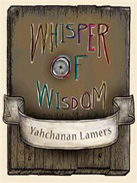"My poetry is but a method I use
In my hope that it be read
It's something that I do to express my views
Bullets only leave people dead."

 |
Whisper of Wisdom by Yahchanan Lamers Trafford Publishing
book review by J.A. Garcia
This collection contains tributes and reflections on the author's personal faith along with views on the intersection of current politics, culture, and religion. Rooted in the teachings of The House of Yahweh, the opening poem, "Bands of Lovingkindness," rejoices in the promise of judgment and salvation. However, "Houses with High Places" shifts gears, raising an etymological controversy concerning both the name Jesus and the widespread use of the word Lord. One of the latter selections, "Nicene's Creed" covers similar ground, also exploring the changing of the Sabbath from Saturday to Sunday. Finally in an addendum, Lamers departs from poetic verse to touch on one final controversy: the holy trinity.
Through the use of rhythmic verse, Lamers claims various linguistic controversies observed in common Christian beliefs and practices. Going back to the Hebraic foundations of Judeo-Christian teachings, Lamers calls the translation of the name Jesus into question. As explored in "Nicene's Creed," whereas the name Jesus seemingly incorporates the name of Greco-Roman god Zeus, the little known name Yahshua fittingly pays tribute to Yahweh. Lamers goes on to argue that religious celebrations and invocations of the term "Lord" are likewise idolatrous because of a possible direct translation to the biblical Baal. Select poems also reveal a clear point-of-view on the question of religion and its clashes with the modern world. Among the arguably more controversial poems is "Louisiana's (sic) Lesson Learned," in which the author suggests any troubles or natural disasters experienced by the state reveal a divine judgment brought on by Cajun culture and alternative lifestyles.
For readers unfamiliar with the teachings of The House of Yahweh, claims made concerning sacred names are certainly worthy of further investigation, and Lamers conveniently provides references to corresponding scripture for readers. Indeed, at times controversial and dogmatic, these poetic musings spark debate.